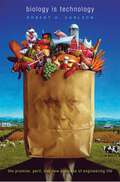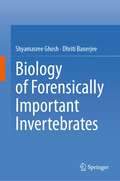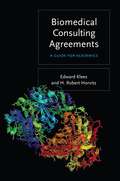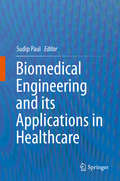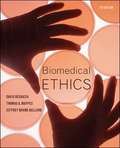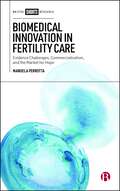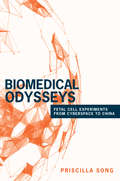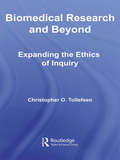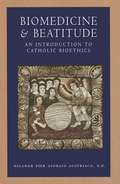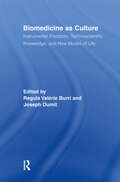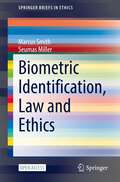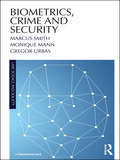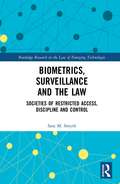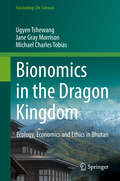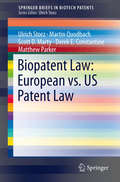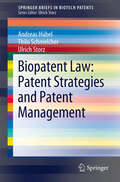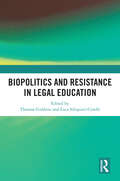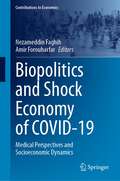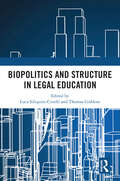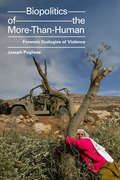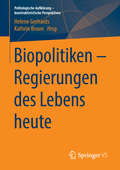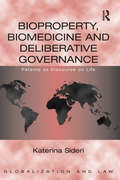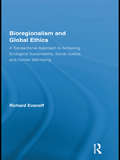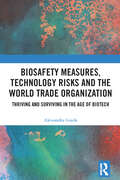- Table View
- List View
Biologically Modified Justice
by Colin FarrellyTheories of distributive justice tend to focus on the issue of what constitutes a fair division of 'external' goods and opportunities; things like wealth and income, opportunities for education and basic liberties and rights. However, rapid advances in the biomedical sciences have ushered in a new era, one where the 'genetic lottery of life' can be directly influenced by humans in ways that would have been considered science fiction only a few decades ago. How should theories of justice be modified to take seriously the prospect of new biotechnologies, especially given the health challenges posed by global aging? Colin Farrelly addresses a host of topics, ranging from gene therapy and preimplantation genetic diagnosis, to an 'anti-aging' intervention and the creation and evolution of patriarchy. This book aims to foster the interdisciplinary dialogue needed to ensure we think rationally and cogently about science and science policy in the twenty-first century.
Biology Is Technology: The Promise, Peril, and New Business of Engineering Life
by Robert H. Carlson“Essential reading for anyone who wishes to understand the current state of biotechnology and the opportunities and dangers it may create.” —American ScientistTechnology is a process and a body of knowledge as much as a collection of artifacts. Biology is no different—and we are just beginning to comprehend the challenges inherent in the next stage of biology as a human technology. It is this critical moment, with its wide-ranging implications, that Robert Carlson considers in Biology Is Technology. He offers a uniquely informed perspective on the endeavors that contribute to current progress in this area—the science of biological systems and the technology used to manipulate them.In a number of case studies, Carlson demonstrates that the development of new mathematical, computational, and laboratory tools will facilitate the engineering of biological artifacts—up to and including organisms and ecosystems. Exploring how this will happen, with reference to past technological advances, he explains how objects are constructed virtually, tested using sophisticated mathematical models, and finally constructed in the real world.Such rapid increases in the power, availability, and application of biotechnology raise obvious questions about who gets to use it, and to what end. Carlson’s thoughtful analysis offers rare insight into our choices about how to develop biological technologies and how these choices will determine the pace and effectiveness of innovation as a public good.
Biology of Forensically Important Invertebrates
by Shyamasree Ghosh Dhriti BanerjeeThis book emphasizes the important role of invertebrates in forensic sciences in the detection of crimes, determining the time and place of death, estimating the minimum Post-Mortem Interval (PMI), and determining the cause of death. The initial chapter discusses the forensically essential invertebrates, especially flies under Order Diptera. Further, the book highlights the importance, biology, taxonomy, and biodiversity of flies under Order Diptera with forensic importance. It also discusses the Cuticular HydroCarbons (CHC) and spectrometry-based studies reported from flies and larvae of forensic importance. It further reviews the importance of DNA barcoding in molecular taxonomy-based studies on forensic flies through understanding, identification, and grouping the organisms. Towards the end, this book presents the applications and limitations of forensic entomology in cases of animal cruelty to a veterinary professional.
Biomedical Consulting Agreements
by Edward Klees H. Robert HorvitzThere can be a clash of cultures when academic scientists negotiate consulting agreements with biotechnology or pharmaceutical companies. Scientists, accustomed to the collegial atmosphere of the laboratory and sometimes disdainful of legal paperwork, might be less than diligent in reading the fine print. On the other hand, a company--motivated to protect discoveries and trade secrets--might write provisions that are favorable to its interests, leaving it to the scientist to raise objections or offer a counterproposal. The scientist, meanwhile, might believe that it would be impolite or antagonistic to raise questions about a company's agreement. This book offers an essential guide for academic scientists and physicians who are considering consulting work in the field of biomedicine. In it, the authors--an attorney and a Nobel Laureate in Medicine, both with extensive experience reviewing and negotiating consulting agreements--outline key issues to consider before signing a consulting agreement. These issues range from the obvious--intellectual property, confidentiality, and fees--to those that might not spring immediately to mind, including indemnity, different classes of stock, and the relevance of insider trading and securities laws.
Biomedical Engineering and its Applications in Healthcare
by Sudip PaulThis book illustrates the significance of biomedical engineering in modern healthcare systems. Biomedical engineering plays an important role in a range of areas, from diagnosis and analysis to treatment and recovery and has entered the public consciousness through the proliferation of implantable medical devices, such as pacemakers and artificial hips, as well as the more futuristic technologies such as stem cell engineering and 3-D printing of biological organs. Starting with an introduction to biomedical engineering, the book then discusses various tools and techniques for medical diagnostics and treatment and recent advances. It also provides comprehensive and integrated information on rehabilitation engineering, including the design of artificial body parts, and the underlying principles, and standards. It also presents a conceptual framework to clarify the relationship between ethical policies in medical practice and philosophical moral reasoning. Lastly, the book highlights a number of challenges associated with modern healthcare technologies.
Biomedical Ethics (Seventh Edition)
by David Degrazia Thomas Mappes Jeffrey BallardThis best-selling anthology of readings with case studies provides insightful and comprehensive treatment of ethical issues in medicine. Appropriate for courses taught in philosophy departments, bioethics programs, as well as schools of medicine and nursing, the collection covers such provocative topics as biomedical enhancement, clinical trials in developing countries, animal research, physician-assisted suicide, and health care reform. The text's effective pedagogical features include chapter introductions, argument sketches, explanations of medical terms, headnotes, and annotated bibliographies.
Biomedical Innovation in Fertility Care: Evidence Challenges, Commercialization, and the Market for Hope
by Manuela PerrottaAvailable Open Access digitally under CC-BY-NC-ND licence.This book analyses the clashes between evidence-based medicine and the dynamics of an increasingly privatised fertility care industry. With a unique focus on "add-on" treatments, it reveals how these controversial treatments are now widespread and can border on hopemongering.
Biomedical Odysseys: Fetal Cell Experiments from Cyberspace to China
by Priscilla SongThousands of people from more than eighty countries have traveled to China since 2001 to undergo fetal cell transplantation. Galvanized by the potential of stem and fetal cells to regenerate damaged neurons and restore lost bodily functions, people grappling with paralysis and neurodegenerative disorders have ignored the warnings of doctors and scientists back home in order to stake their futures on a Chinese experiment. Biomedical Odysseys looks at why and how these individuals have entrusted their lives to Chinese neurosurgeons operating on the forefront of experimental medicine, in a world where technologies and risks move faster than laws can keep pace. Priscilla Song shows how cutting-edge medicine is not just about the latest advances in biomedical science but also encompasses transformations in online patient activism, surgical intervention, and borderline experiments in health care bureaucracy.Bringing together a decade of ethnographic research in hospital wards, laboratories, and online patient discussion forums, Song opens up important theoretical and methodological horizons in the anthropology of science, technology, and medicine. She illuminates how poignant journeys in search of fetal cell cures become tangled in complex webs of digital mediation, the entrepreneurial logics of postsocialist medicine, and fraught debates about the ethics of clinical experimentation.Using innovative methods to track the border-crossing quests of Chinese clinicians and their patients from around the world, Biomedical Odysseys is the first book to map the transnational life of fetal cell therapies.
Biomedical Research and Beyond: Expanding the Ethics of Inquiry (Routledge Annals of Bioethics #Vol. 5)
by Christopher O. TollefsenWhat is the relationship between scientific research and ethics? Some think that science should be free from ethical and political considerations. Biomedical Research and Beyond argues that ethical guidance is essential for all forms of inquiry, including biomedical and scientific research. By addressing some of the most controversial questions of biomedical research, such as embryonic research, animal research, and genetic enhancement research, the author argues for a rich moral framework for the ethics of inquiry, based on the ideal of human flourishing. He then looks at other areas of inquiry, such as journalistic ethics, and military investigation, to see how similar they are to the ethics of scientific research. Finally, he looks at the virtues that must play a role in any life that is devoted to research and inquiry as a vocational commitment.
Biomedicine And Beatitude: An Introduction to Catholic Bioethics
by Nicanor Pier Giorgio Austriaco<P>How are the patient, the physician, the nurse, and the scientist called to grow in holiness in their particular vocations? This introductory text, written from within the Catholic moral tradition, narrates a bioethics that emphasises the pursuit of beatitude in the lives of those who are confronted by moral questions raised by biomedicine and the other life sciences. <P>The Catholic moral vision that informs this volume is rooted in the moral life described by the Lord Jesus Christ in his Sermon on the Mount. As Pope John Paul II taught in his moral encyclical, Veritatis splendour, we imitate Christ by seeking, with God's grace, to perfect ourselves through our actions and the virtues they engender. In this way, Catholic bioethics differs from other contemporary approaches to bioethics that focus on either the outcomes of human acts or the procedures that protect the autonomy of the human agent. <P>Besides ethical questions raised at the beginning and the end of life, Nicanor Austriaco, O.P., discusses the ethics of the clinical encounter, human procreation, organ donation and transplantation, and biomedical research. Finally, the text discusses the realities faced by citizens of faith living in a free and democratic society that is at the same time postmodern, secular, and liberal.
Biomedicine as Culture: Instrumental Practices, Technoscientific Knowledge, and New Modes of Life (Routledge Studies in Science, Technology and Society)
by Joseph Dumit Regula Valérie BurriThis volume offers interdisciplinary perspectives on contemporary biomedicine as a cultural practice. It brings together leading scholars from cultural anthropology, sociology, history, and science studies to conduct a critical dialogue on the culture(s) of biomedical practice, discussing its epistemic, material, and social implications. The essays look at the ways new biomedical knowledge is constructed within hospitals and academic settings and at how this knowledge changes perceptions, material arrangements, and social relations, not only within clinics and scientific communities, but especially once it is diffused into a broader cultural context.
Biometric Identification, Law and Ethics (SpringerBriefs in Ethics)
by Seumas Miller Marcus SmithThis book is open access. This book undertakes a multifaceted and integrated examination of biometric identification, including the current state of the technology, how it is being used, the key ethical issues, and the implications for law and regulation. The five chapters examine the main forms of contemporary biometrics–fingerprint recognition, facial recognition and DNA identification– as well the integration of biometric data with other forms of personal data, analyses key ethical concepts in play, including privacy, individual autonomy, collective responsibility, and joint ownership rights, and proposes a raft of principles to guide the regulation of biometrics in liberal democracies.Biometric identification technology is developing rapidly and being implemented more widely, along with other forms of information technology. As products, services and communication moves online, digital identity and security is becoming more important. Biometric identification facilitates this transition. Citizens now use biometrics to access a smartphone or obtain a passport; law enforcement agencies use biometrics in association with CCTV to identify a terrorist in a crowd, or identify a suspect via their fingerprints or DNA; and companies use biometrics to identify their customers and employees. In some cases the use of biometrics is governed by law, in others the technology has developed and been implemented so quickly that, perhaps because it has been viewed as a valuable security enhancement, laws regulating its use have often not been updated to reflect new applications. However, the technology associated with biometrics raises significant ethical problems, including in relation to individual privacy, ownership of biometric data, dual use and, more generally, as is illustrated by the increasing use of biometrics in authoritarian states such as China, the potential for unregulated biometrics to undermine fundamental principles of liberal democracy. Resolving these ethical problems is a vital step towards more effective regulation.
Biometrics, Crime and Security (Law, Science and Society)
by Marcus Smith Monique Mann Gregor UrbasThis book addresses the use of biometrics – including fingerprint identification, DNA identification and facial recognition – in the criminal justice system: balancing the need to ensure society is protected from harms, such as crime and terrorism, while also preserving individual rights. It offers a comprehensive discussion of biometric identification that includes a consideration of: basic scientific principles, their historical development, the perspectives of political philosophy, critical security and surveillance studies; but especially the relevant law, policy and regulatory issues. Developments in key jurisdictions where the technology has been implemented, including the United Kingdom, United States, Europe and Australia, are examined. This includes case studies relating to the implementation of new technology, policy, legislation, court judgements, and where available, empirical evaluations of the use of biometrics in criminal justice systems. Examples from non-western areas of the world are also considered. Accessibly written, this book will be of interest to undergraduate, postgraduate and research students, academic researchers, as well as professionals in government, security, legal and private sectors.
Biometrics, Surveillance and the Law: Societies of Restricted Access, Discipline and Control (Routledge Research in the Law of Emerging Technologies)
by Sara M. SmythThe use of biometric identification systems is rapidly increasing across the world, owing to their potential to combat terrorism, fraud, corruption and other illegal activities. However, critics of the technology complain that the creation of an extensive central register of personal information controlled by the government will increase opportunities for the state to abuse citizens. There is also concern about the extent to which data about an individual is recorded and kept. This book reviews some of the most current and complex legal and ethical issues relating to the use of biometrics. Beginning with an overview of biometric systems, the book goes on to examine some of the theoretical underpinnings of the surveillance state, questioning whether these conceptual approaches are still relevant, particularly the integration of ubiquitous surveillance systems and devices. The book also analyses the implementation of the world’s largest biometric database, Aadhaar, in detail. Additionally, the identification of individuals at border checkpoints in the United States, Australia and the EU is explored, as well as the legal and ethical debates surrounding the use of biometrics regarding: the war on terror and the current refugee crisis; violations of international human rights law principles; and mobility and privacy rights. The book concludes by addressing the collection, use and disclosure of personal information by private-sector entities such as Axciom and Facebook, and government use of these tools to profile individuals. By examining the major legal and ethical issues surrounding the debate on this rapidly emerging technology, this book will appeal to students and scholars of law, criminology and surveillance studies, as well as law enforcement and criminal law practitioners.
Bionomics in the Dragon Kingdom: Ecology, Economics and Ethics in Bhutan (Fascinating Life Sciences)
by Michael Charles Tobias Jane Gray Morrison Ugyen TshewangThis compact and elegant work (equally fitting for both academic as well as the trade audiences) provides a readily accessible and highly readable overview of Bhutan’s unique opportunities and challenges; all her prominent environmental legislation, regulatory statutes, ecological customs and practices, both in historic and contemporary terms. At the same time, Bionomics places the ecological context, including a section on animal rights in Bhutan, within the nation’s Buddhist spiritual and ethical setting. Historic contextualization accents the book’s rich accounting of every national park and scientific reserve, as well as providing up-to-the-minute climate-change related hurdles for the country.Merging the interdisciplinary sciences, engineering and humanities data in a compelling up-to-date portrait of the country, the authors have presented this dramatic compendium against the backdrop of an urgent, global ecological time-frame. It thus becomes clear that the articulated stakes for Bhutan, like her neighboring Himalayan and Indian sub-continental countries (China, India, Bangladesh and Myanmar) are immense, as the Anthropocene epoch unfolds, affecting every living being across the planet. Because Bhutan’s two most rewarding revenue streams derive from the sale of hydro-electric power and from tourism, the complexities of modern pressures facing a nation that prides herself on maintaining traditional customs in what has been a uniquely isolated nation are acute.
Biopatent Law: European Patent Law Vs. Us Patent Law (SpringerBriefs in Biotech Patents)
by Matthew Parker Ulrich Storz Martin Quodbach Scott D. Marty Derek E. ConstantineSpringerBriefs in Biotech Patents presents timely reports on intellectual properties (IP) issues and patent aspects in the field of biotechnology. This volume focus on particular aspects of the US patent law, which can have tremendous differences compared to the European law. This includes questions of biopatent prosecution, novelty, inventive step, written disclosure and sufficiency of enablement as well as questions of law enforcement of biotech patents.
Biopatent Law: Patent Strategies And Patent Management (SpringerBriefs in Biotech Patents)
by Ulrich Storz Andreas Hübel Thilo SchmelcherPatents protecting biotechnological invention are becoming ever more important. Because biotechnology has many differences with respect to other technologies, lessons learned in other fields of technology cannot simply be transferred to adopt a suitable strategy for dealing with biotechnology inventions. In this volume, general aspects of biopatent law will be discussed. This involves questions of patentability, including ethical issues and issues of technicality, as well as questions of patent exhaustion in cases were reproducible subject matter, like cells or seeds, is protected. Moreover, active and passive patent strategies are addressed. Further, insight will be given into patent lifetime management and additional protective measures, like supplementary protection certificates and data exclusivity. Here, strategies are discussed how market exclusivity can be extended as long as possible, which is particularly important for biopharmaceutical drugs, which create high R&D costs.
Biopolitics and Resistance in Legal Education
by Thomas Giddens and Luca Siliquini-CinelliTaking up the study of legal education in distinctly biopolitical terms, this book provides a critical and political analysis of resistance in the law school. Legal education concerns the complex pathways by which an individual becomes a lawyer, making the journey from lay-person to expert, from student to practitioner. To pose the idea of a biopolitics of legal education is not only to recognise the tensions surrounding this journey but also to recognise that legal education is a key site in which the subject engages, and is engaged by, a particular structure—and here the particular structure of the law school. This book explores the resistance to that structure, including: different ways in which law’s pedagogic structures might be incomplete, or are being fought against; the use of less conventional elements of cultural discourse to resist the abstraction of the lawyer in students’ subject formation; the centralisation of queer and feminist discourses to disrupt the hierarchies of the legal curriculum; the use of digital technologies; the place of embodiment in legal education settings; and the impacts of posthuman knowledges and contexts on legal learning. Assembling original, field-defining essays by both leading international scholars and emerging researchers, this book constitutes an indispensable resource in legal education research and scholarship that will appeal to legal academics everywhere.
Biopolitics and Shock Economy of COVID-19: Medical Perspectives and Socioeconomic Dynamics (Contributions to Economics)
by Nezameddin Faghih Amir ForouharfarThis edited volume discusses the biopolitics and shock economy of COVID-19, emphasizing medical perspectives and the socioeconomic dynamics of the pandemic and the ensuing institutional responses. Written by an international, multidisciplinary group of academic and professional experts, chapters embrace a wide range of topics such as: medical perspectives on COVID-19; application of geospatial technology; infectivity, immunogenicity, and disease as important factors for adoption of relevant biopolitical measures; shock economy; COVID-19-induced transaction costs; social support and resilience of inhabitants of marginalized areas; business resilience factors; entrepreneurship; and digital transformation. Jointly addressing global examples of biopolitical governance and overarching macroeconomic effects of the pandemic, this volume will be of interest to academics across disciplines as well as policymakers and practitioners on the ground.
Biopolitics and Structure in Legal Education
by Luca Siliquini-Cinelli and Thomas GiddensTaking up the study of legal education in distinctly biopolitical terms, this book provides a critical and political analysis of structure in the law school. Legal education concerns the complex pathways by which an individual becomes a lawyer, making the journey from lay-person to expert, from student to practitioner. To pose the idea of a biopolitics of legal education is not only to recognise the tensions surrounding this journey, but also to recognise that legal education is a key site in which the subject engages, and is engaged by, a particular structure—and here the particular structure of the law school. This book explores that structure by addressing the characteristics of the biopolitical orders engaged in legal education, including: understanding the lawyer as a commodity, unpicking the force relations in legal education, examining the ways codes of conduct in higher education impact academic freedom, as well as putting the distinctly Western structures of legal learning within a wider context. Assembling original, field-defining essays by both leading international scholars and emerging researchers, it constitutes an indispensable resource in legal education research and scholarship that will appeal to legal academics everywhere.
Biopolitics of the More-Than-Human: Forensic Ecologies of Violence (ANIMA: Critical Race Studies Otherwise)
by Joseph PuglieseIn Biopolitics of the More-Than-Human Joseph Pugliese examines the concept of the biopolitical through a nonanthropocentric lens, arguing that more-than-human entities—from soil and orchards to animals and water—are actors and agents in their own right with legitimate claims to justice. Examining occupied Palestine, Guantánamo, and sites of US drone strikes in Afghanistan, Pakistan, Somalia, and Yemen, Pugliese challenges notions of human exceptionalism by arguing that more-than-human victims of war and colonialism are entangled with and subject to the same violent biopolitical regimes as humans. He also draws on Indigenous epistemologies that invest more-than-human entities with judicial standing to argue for an ethico-legal framework that will enable the realization of ecological justice. Bringing the more-than-human world into the purview of justice, Pugliese makes visible the ecological effects of human war that would otherwise remain outside the domains of biopolitics and law.
Biopolitiken – Regierungen des Lebens heute: Regierungen Des Lebens Heute (Politologische Aufklärung – konstruktivistische Perspektiven)
by Helene Gerhards Kathrin BraunDas Buch versammelt konstruktivistische Perspektiven auf das Konzept „Biopolitik“. Dadurch werden die Analysepotentiale für aktuelle Phänomene, die den Zusammenhang zwischen dem Leben und dem Lebendigen und der Regierbarmachung betreffen, ausgelotet. Im Fokus stehen die Strategien und die Objekte der Regierungs- und Regulierungsbemühungen: In welcher Weise werden gesellschaftliche Probleme konstruiert und bestimmten „Zielscheiben“ zugeschrieben? Welche Subjektivierungsformen lassen sich im Rahmen biopolitischer Zugriffe ausmachen? Inwiefern spielen spezifische sozialtheoretische Überlegungen und Konzeptionen von Zeit für biopolitische Strategien und Konflikte eine Rolle? An welchen Gegenständen sind die fortdauernden Konflikte, die sich im Spannungsfeld zwischen Medizin, Ethik und Politik ergeben, zu explizieren?
Bioproperty, Biomedicine and Deliberative Governance: Patents as Discourse on Life (Globalization And Law Ser.)
by Katerina SideriBiomedical patents have been the subject of heated debate. Regulatory agencies such as the European Patent Office make small decisions with big implications, which escape scrutiny and revision, when they decide who has access to expensive diagnostic tests, whether human embryonic stem cells can be traded in markets, and under what circumstances human health is more important than animal welfare. Moreover, the administration of the Trade Related Aspects of Intellectual Property Rights by the World Trade Organization has raised considerable disquiet as it has arguably created grave health inequities. Those doubting the merits of the one size fits all approach ask whether priority should be given to serving the present needs of populations in dire need of medication or to promoting global innovation. The book looks in detail into the legal issues and ethical debates to ask the following three main questions: First, what are the ideas, goals, and broader ethical visions that underpin questions of governance and the legal reasoning employed by administrative agencies? Second, how can we democratize the decision making process of technocratic institutions such as the European Patent Office? Finally, how can we make the global intellectual property system more equitable? In answering these questions the book seeks to contribute to our understanding of the role and function of regulatory agencies in the regulation of the bioeconomy, explains the process of interpretation of legal norms, and proposes ways to rethink the reform of the patent system through the lens of legitimacy.
Bioregionalism and Global Ethics: A Transactional Approach to Achieving Ecological Sustainability, Social Justice, and Human Well-being
by Richard EvanoffWhile a number of schools of environmental thought — including social ecology, ecofeminism, ecological Marxism, ecoanarchism, and bioregionalism — have attempted to link social issues to a concern for the environment, environmental ethics as an academic discipline has tended to focus more narrowly on ethics related either to changes in personal values or behavior, or to the various ways in which nature might be valued. What is lacking is a framework in which individual, social, and environmental concerns can be looked at not in isolation from each other, but rather in terms of their interrelationships. In this book, Evanoff aims to develop just such a philosophical framework — one in which ethical questions related to interactions between self, society, and nature can be discussed across disciplines and from a variety of different perspectives. The central problem his study investigates is the extent to which a dichotomized view of the relationship between nature and culture, perpetuated in ongoing debates over anthropocentric vs. ecocentric approaches to environmental ethics, might be overcome through the adoption of a transactional perspective, which offers a more dynamic and coevolutionary understanding of how humans interact with their natural environments. Unlike anthropocentric approaches to environmental ethics, which often privilege human concerns over ecological preservation, and some ecocentric approaches, which place more emphasis on preserving natural environments than on meeting human needs, a transactional approach attempts to create more symbiotic and less conflictual modes of interaction between human cultures and natural environments, which allow for the flourishing of both.
Biosafety Measures, Technology Risks and the World Trade Organization: Thriving and Surviving in the Age of Biotech
by Alessandra GuidaThis book examines the work of the World Trade Organization (WTO), with a focus on the capacity of its judiciary to strike a reasoned balance between free trade in biotechnology and biosafety as to promote the 2030 Agenda for Sustainable Development and its Sustainable Development Goals. By adopting an innovative interpretation of the precautionary principle and proportionality analysis, the work offers normative suggestions to develop what the author terms “a constructive bridge of knowledge” between decision-makers, scientists, social experts and expert witnesses, which can support a judicial balance by design rather than by chance. Biotechnology is sometimes regarded as a panacea for modern-day challenges, such as feeding a growing world population and counteracting climate-change problems, and a means of offering significant economic opportunities. However, biotechnology can present uncertain, though serious, risks to human health and the environment (i.e., biosafety). Trading biotech products magnifies these risks and benefits globally. This book explores the topical, though still underexplored, question of how to find a point of equilibrium between the revolutionary advancement offered by technology and the need to safeguard biosafety from uncertain, though potentially irreversible, technology risks. It offers a thorough analysis of normative, judicial and epistemic issues hindering a reasoned balance between trade and non-trade interests under the WTO. The work offers practical relevance for the resolution of legal disputes in contexts of uncertainty, as well as innovative theoretical contributions. It will be a valuable resource for policymakers working on precautionary governance and management, scholars in the areas of trade law, human rights law and environmental law, law students and practitioners, as well as NGOs working in the field of new technologies, biosafety, sustainability and food safety.

